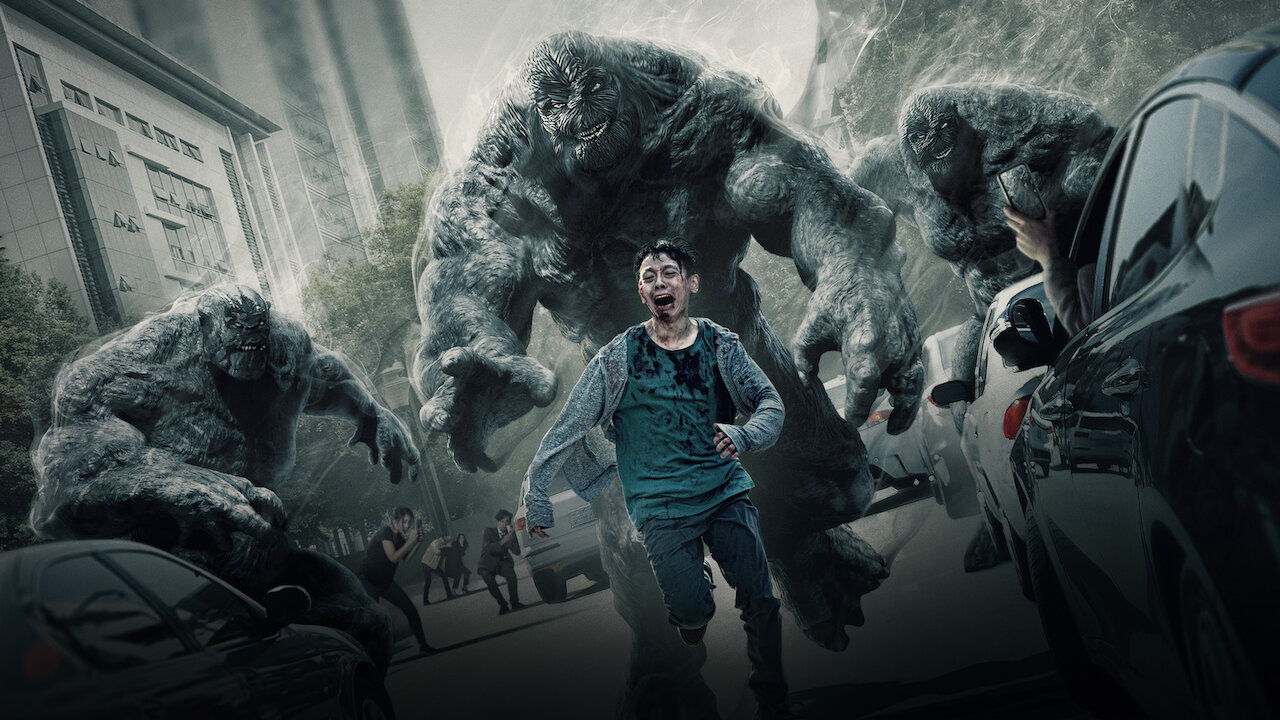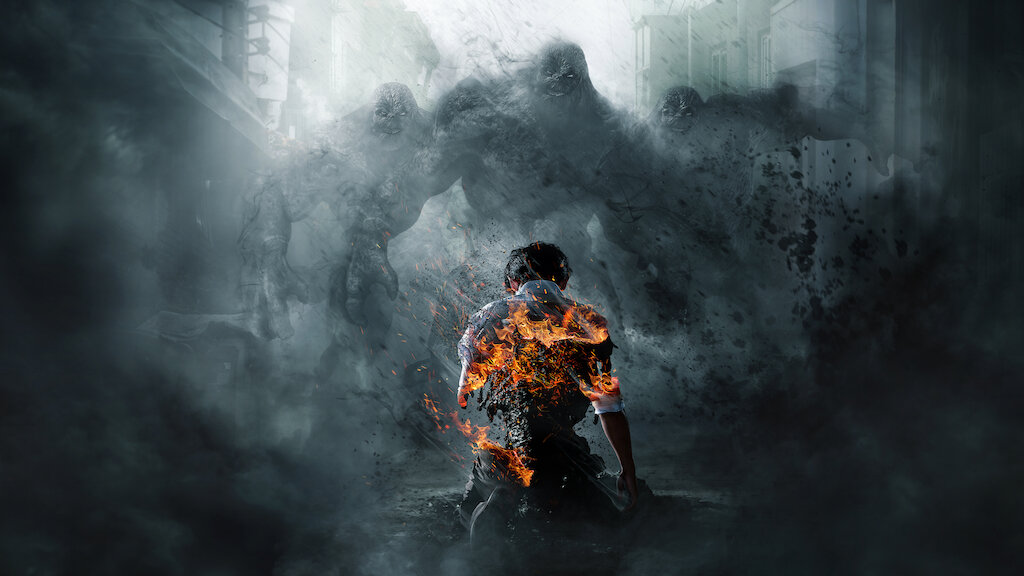Hellbound recently supplanted Squid Game as Netflix’s most-streamed series. Is it worthy of the title? Are comparisons between the two valid, or simply a case of being from the same culture?

A man sits alone at a cafe. He is surrounded by a crowd of people, families with children, students, people going about their day. A group of young people gather around a laptop, discussing the prophetic, strange words of Jeong Jin-soo, the leader of the emerging New Truth Society, a cult that preaches humanity has strayed from God’s path. The rumoured emergence of creatures from Hell that murder “sinners” in a merciless public display are a clear sign of His wrath and the fact we must change our wicked ways before it’s too late. The man checks his phone. 1:19pm. He sweats nervously. He has nothing in front of him, nothing to eat or drink. He appears to be waiting. 1:20pm. Nothing happens for a few seconds. He appears relieved. But then we hear a distant crash, a roar, and we see the creatures from Jin-soo’s video are not rumours.
Director Yeon Sang-ho (Train to Busan) directs this adaptation of his own webtoon, that has quickly taken over trending on social media. It is easy to see the appeal – a story about humanity and morality that pulls no punches. There’s nothing to break up the tension in this first scene, no sly nods to the fourth wall, no characters quipping about the danger they’re in. No, this is a straight up and down execution – and its brutal effectiveness is immediately engaging.
The Word of God

It’s too bad the series doesn’t maintain this level of tension and excitement. What follows is a series that certainly has fascinating and well-executed parts. But on the whole, feels a little hamfisted (and relentlessly bleak). We’re introduced to cop Jin Kyeong-hoon, who is tasked with investigating the murders perpetrated by these creatures. The philosophical battle of wits between Kyeong-hoon and Jin-soo is in all honesty fairly surface-level. Cliches abound on both sides as the rationalist clashes with the man of faith.
This is not the first time the series covers some pretty familiar territory. Perhaps one of the most notable tropes of genre fare like this is the notion that humans will liberally interpret the “word of God” and use it for their own advancement. Or further, in terms of the way it affects people as a whole, it can make crowds turn on each other, abandoning their sense of community and falling into a trap of hysteria, scorn and religious propaganda. The world is depicted as one without room for shades of grey. You are either a sinner or you’re not, and regardless of the nature and seriousness of the crimes you’ve “committed”, you deserve to suffer.
The first three episodes of the series establish this world and the reaction to it. There is a time jump between the third and fourth episode, and we see a world where the dogmatic approach of the New Truth Society has come to dominate Korea (and only hinted at but the world at large too). The organisation has essentially taken over the government, with the Deacons enjoying free reign with the extremist, militarised arm of the Society, Arrowhead, being used to ruthlessly enforce their rule.
Allegory & Subtlety
Hellbound attempts to make some interesting observations about the nature of human society in the 21st century. In some respects, it even succeeds. Especially the tendency for us to believe what we see. The New Truth Society uses the internet and video evidence of these creatures attacking people in other parts of the world to begin to spread their message, which is reinforced by the appearance of the creatures in Korea themselves. When we’re faced with the unknown, humans will often gravitate towards comforting notions like simplistic views of the nature of faith, and good and evil (saint vs sinner).
However, it ultimately comes across as a little trite and obvious. Hellbound is by no means the first piece of fiction to observe the brutality of man, especially when that inherent brutality is given justification through the means of belief in a higher power. Squid Game was not exactly subtle in its criticism of late-stage capitalism – but compared to the almost “beat you over the head” nature of the storytelling in Hellbound, it comes across as relatively quite subtle indeed.

And this was, when it comes down to it, the single biggest problem I had with Hellbound. I found it to be a story fairly clumsily told. The characters were also fairly poorly drawn – perhaps the most interesting is the lawyer Min Hye-jin, an outspoken opponent of these extremists who after being brutally attacked by Arrowhead becomes something of a revolutionary. Others however largely came across as cliched – the cop with a dark past, the cult leader masquerading as selfless but with his own agenda.
Other Issues
In addition to these problems I had with the storytelling, there were other elements that contributed to my sense of Hellbound being a fairly average series. The pacing is pretty abysmal, with the action either moving at 100 miles an hour or proceeding at a near-glacial rate. Perhaps this is best exemplified by the time jump, which comes unannounced and leaves some dangling unresolved threads from the first half. I found it to be quite jarring as an audience member.
Another major issue is the VFX. I’m aware not every production has the same budget as a Marvel television show, but for a series that relies on people being scared of the monsters that come to drag you to hell, said monsters are decidedly unscary. One of Spielberg’s greatest film-making lessons he has taught us comes from his theatrical debut (Jaws). By necessity, the glimpses we have of the titular monster are small and sparing, giving our imagination the job of filling in the gaps. Compared to this and other monster features that employ this technique, Hellbound’s creatures are not in the least intimidating. Perhaps it’s a symptom of living in a world with some pretty great CGI, but they look like vague blurs of smoke. What they do to people is quite shocking, but the way they look is almost comical.
As far as the comparisons go with Squid Game, I wouldn’t put Hellbound in the same conversation. Squid Game was a tough watch at times but it had compelling characters with clear motivations and goals – something that Hellbound lacks. It feels meandering and pointless for much of the run time. With the disparate plot threads only really coming together in the last episode. Compared to the tight, purposeful storytelling present in Netflix’s other Korean hit of 2021, Hellbound is in my opinion inferior in nearly every way.
Hellbound is now streaming on Netflix.
Subscribe to FIB’s Weekly Breaking News Report for your weekly dose of music, fashion and pop culture news!






